Iraqi FM urges US for quick release of Iran's frozen funds
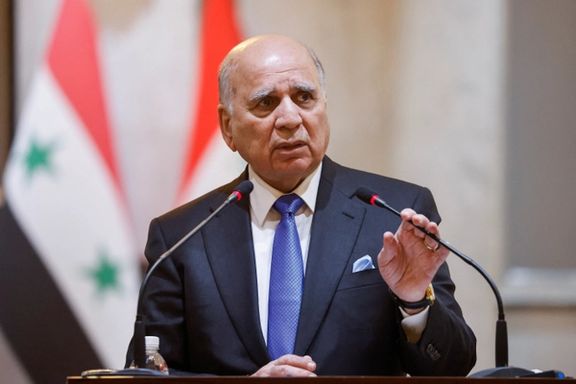
Foreign Minister Fuad Hussein has urged the US to find a swift solution for releasing Iran's frozen funds in Iraq on Friday, according to the Iraqi News Agency (INA).

Foreign Minister Fuad Hussein has urged the US to find a swift solution for releasing Iran's frozen funds in Iraq on Friday, according to the Iraqi News Agency (INA).
Hussein emphasized to US Acting Under Secretary for Political Affairs John Bass "the need for a quick and fair solution that serves the interests of both parties and enhances financial stability in the region," according to an Iraqi Foreign Ministry statement.
This is while, in May, a senior Iranian official stated that Tehran has no blocked funds in Iraq, following sanction waivers issued by the current US administration in 2023 and earlier this year, allowing Baghdad to release these funds.
Iran exports natural gas and electricity to Iraq, but Baghdad could not pay the debt due to US banking sanctions imposed on Tehran in 2018. However, the renewal of Iraq’s waivers by both the Trump and Biden administrations has mainly been a routine matter.
Nevertheless, while exempting Iraq from sanctions on importing energy from Iran is not a new policy, Baghdad's permission to make payments in hard currency is a recent development. The Biden administration introduced this provision last year as part of the waiver and has faced backlash from US lawmakers since.
The Biden administration has stated that the funds, held in euros in Oman, can only be used for humanitarian purposes under the waiver's terms. However, critics contend that this arrangement has effectively freed up resources for Iran to support its proxies across the Middle East and advance its nuclear weapons program.
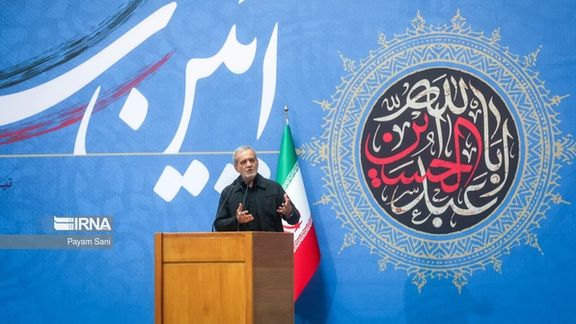
Choosing cabinet ministers and getting a vote of confidence for his ministers from the parliament is one of the biggest challenges Iran's newly elected reform-oriented President Masoud Pezeshkian is facing.
Supreme Leader Ali Khamenei will endorse Pezeshkian and inaugurate his presidency at a ceremony on July 28. Two days later, he will be sworn in by the Parliament after which he will have two weeks to present his cabinet for a vote of confidence.
Pezeshkian's campaign has formed committees to investigate candidates for ministerial positions. Every committee, the campaign says, must include two academics and two “non-academic elite professionals", a representative of the Reforms Front, a representative of the private sector appointed by the Chamber of Commerce, two representatives of trade associations and non-governmental organizations, a representative of former ministers as well as a representative of “women and ethnic [groups] or [religious] minorities”.
The campaign has also said that at least 60 percent of the proposed ministers must be under 50 years of age, 60 percent should not have served as ministers in other governments and 20 percent must be women or belong to minorities.
Pezeshkian is first and foremost under pressure from voters who expect him to form a “different” cabinet that meets their many demands for improvement of Iran's international ties and the economy as well as more social freedoms and freedom of speech.
There are claims that Pezeshkian is under pressure from reformists and their de facto leader, former President Mohammad Khatami, to pick his cabinet members from among their candidates but neither Pezeshkian nor his campaign has commented about these claims so far.
The Sunni minority and various ethnic groups who voted for Pezeshkian expect him to give a proportionate share to their representatives in his cabinet, a difficult task given the Shiite nature of the regime. At the same time, women also expect him to appoint one or several female ministers.
Only one woman has ever been accepted as a minister in the Islamic Republic. It was under populist Mahmoud Ahmadinejad, before he fell from Khamenei’s favor in 2011.
Hamideh Zarabadi, Pezeshkian’s campaign spokeswoman, said Thursday that at least one woman is likely to be included in his list of proposed candidates.
Reformists' supporters have repeatedly reminded Pezeshkian of their role in his victory by chanting Khatami’s name as well as the name of Mir-Hossein Mousavi, the leader of the Green Movement who has been under house arrest since 2011, during campaign and post-election gatherings.
Supporters of his rivals have also been urging him to include some of their candidates in his cabinet to prove that he is an independent as he insists he is.
Above all these pressures and demands, Khamenei has always been heavily involved in the appointment of cabinet ministers according to an unwritten law that allows him to veto the president’s choices even before the cabinet’s presentation to the parliament.
Pezeshkian canceled his press briefing with international and domestic media representatives a day after the announcement of his election win to hold a five-hour meeting with Khamenei. He is likely to have been “advised” about his future moves including forming his cabinet.
The president’s powers in the appointment of ministers of foreign affairs, interior, defense, and intelligence are particularly limited since these ministries are considered as Khamenei’s "domain".
Reformist newspapers reported in 1997 that the conservative Ghorbanali Dorri-Najafabadi was the fourteenth option on the list of intelligence minister candidates that the reformist Mohammad Khatami proposed to Khamenei to get his approval.
Similarly, in 2011, Mahmoud Ahmadinejad’s insistence on replacing the intelligence minister, Heydar Moslehi, led to an eleven-day standoff between the Leader and the president. Ahmadinejad was reportedly given a choice: to keep the minister or resign.
Pezeshkian may face fewer challenges in appointing vice presidents who sit in cabinet meetings since the Parliament's approval is not required for these positions. Nevertheless, his choice of the head of the Atomic Energy Organization is considered very sensitive and likely to depend on Khamenei’s approval.
The new president and his supporters may be counting on some support from the more pragmatic hardliner Speaker Mohammad-Bagher Ghalibaf for helping the approval of his cabinet candidates. The latter’s bid for the presidency was aborted by ultra-hardliner rival Saeed Jalili and the Paydari (Steadfastness) Party that supported him.
Supporters of the two hardliner parliamentary factions have been blaming each other for the defeat in the snap elections and are fighting a full-on battle on social media.
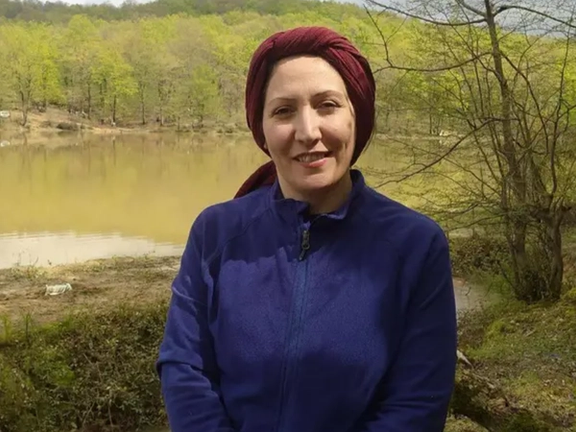
Robin Korte, a member of North Rhine-Westphalia regional parliament in Germany, has undertaken political sponsorship of Iranian labor activist Sharifeh Mohammadi, who has been sentenced to death.
"The regime in Iran is using the utmost brutal means to fight its opponents. Human rights violations occur day-to-day. This was also the case with Sharifeh Mohammadi,” Korte said in a statement.
Korbe added that “Almost two years after the murder of Jina Mahsa Amini, we Europeans must not tire of taking a principled and public stand against the crimes in Iran. We must make it clear: We are watching and protesting."
The death sentence for Mohammadi, a labor activist imprisoned in Iran on trumped-up charges of armed rebellion, has sparked widespread condemnation from activists. They maintain that the sentence is based on the pretext of her membership in an independent, public, and legal labor organization from a decade ago, highlighting the perceived unfairness of the verdict.
Mohammadi, arrested in December 2023, represents one of the latest victims in a wave of executions intended to suppress dissent. According to the United Nations, 834 Iranians were executed last year, marking a record high and a 50 percent increase from the previous year. Among those executed, at least 22 were women, positioning Iran as the world's leading executioner of women. The 2023 figures, the highest since 2014, were reported by Iran Human Rights.
Since the Woman Life Freedom movement in 2022, several members of the German parliament have been politically sponsoring Iranian political prisoners, many of whom face imminent execution on spurious charges.
During the nationwide protests in Iran, security forces conducted a severe crackdown. This response resulted in the deaths of at least 550 protesters and was condemned as a crime against humanity by a UN fact-finding mission.
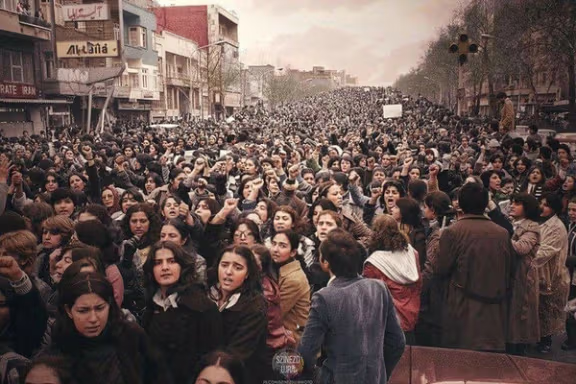
Germany-based Iranian dissident Mina Ahadi has accused Iran's newly elected President Masoud Pezeshkian of violently enforcing the hijab on women at a university in 1979, well before it became mandatory.
Ahadi, who studied medicine at the University of Tabriz alongside her classmate Pezeshkian, told Iran International that after the Islamic Revolution, a radical group declared that women should wear the hijab, and it was Pezeshkian who was responsible for this group.
“It was not an official policy from [Supreme Leader] Khomeini or Tehran,” she recalled.
Ahadi’s first hand experience of Pezeshkian’s alleged misogyny directly challenges the mainstream media’s portrayal of Pezeshkian as a “reformer.”
“At first we did not take them seriously because they were a small group. We organized demonstrations on the streets of Tabriz. I held speeches on the street. We were against the hijab,” she said.
According to her, the Islamists “with beards were aggressive” and were part of Pezeshkian’s pro-Khomeini movement.
“[They] attacked us and said sexual insults. Later these men came with knives," she said.
As violence against women intensified in Tabriz, northwest Iran, Ahadi said protesters were forced to retreat from their street demonstrations.
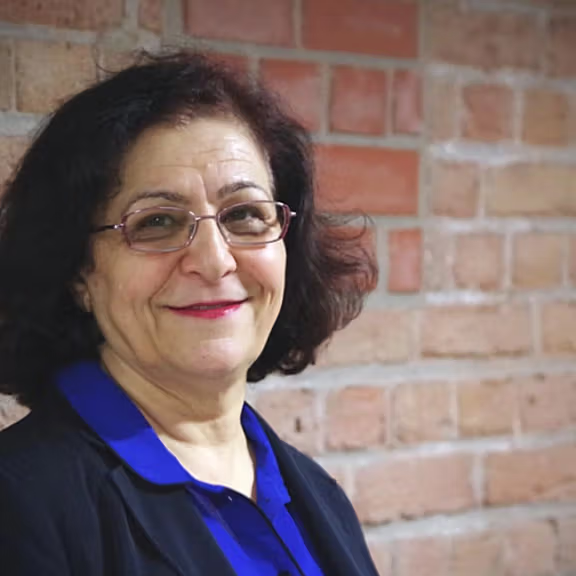
“During one demonstration, a 16-year-old girl fell. I felt compelled to help her and went back, even though the men were chasing us with knives. It was very dangerous,” said Ahadi.
She also recounted that during her time working at a hospital near the medical school, Pezeshkian insisted that female employees wear a hijab. Some men told Ahadi, “If you want to enter the hospital, you need to wear a hijab.”
Ahadi said one of the Islamists, part of Pezeshkian’s group, enforced the compulsory hijab at the Tabriz hospital with a pistol. She responded, “If you have the courage, shoot.”
The dissident, who at the time was part of the Iranian left in Tabriz, said Khomeini’s “cultural revolution purged all universities” of secular freedoms.
According to her, Pezeshkian boasted that the University of Tabriz was the first Iranian university to undergo a "cultural revolution" orchestrated by the Islamic Republic.
This Islamist-driven purge of Tabriz's academic institutions, Ahadi said, led to her expulsion.
Pezeshkian and his violent Islamist movement in Tabriz were responsible for the murders of three students, according to Ahadi. She posted a picture on X of a student named Massoud, whose eyes were gouged out due to his opposition to the emerging Islamist regime. Two other students were also reportedly executed by the Islamists in Tabriz.
“We brought Massoud to a cemetery, and I delivered a speech. I said that this is a reactionary regime that is beginning to murder people,” she recounted.
The Islamic Republic executed Ahadi's husband in 1980. She was not at home when the regime raided her apartment and seized him.
Ahadi, who served as the spokeswoman for the Anti-Stoning Committee against the Islamic Republic’s medieval practice primarily targeting women, said, “Pezeshkian gave an interview with Iranian TV and said he ordered the hijab at the university before Khomeini started it.”
This week, the Iranian state-controlled outlet Tabnak posted one of Pezeshkian’s previous interviews regarding his role in implementing the forced hijab. Subsequently, the Middle East Media Research Institute (MEMRI) publicized and shared the Tabnak report widely.
Ahadi’s account further corroborates Iran International contributor Majid Mohammadi’s piece, which details Pezeshkian’s misogynistic actions.
“He has been a strong advocate of compulsory hijab and cancel culture, even stating that he enforced these policies in a hospital and university under his management right after the 1979 Islamic takeover, before they were mandated,” Mohammadi wrote recently.
According to Ahadi and Mohammadi, Pezeshkian’s revolutionary political Islamism was even more extreme than Khomeini’s, who enforced the compulsory hijab in 1983.
Following the 1979 Islamic Revolution that toppled the Shah, fervent slogans such as "Wear a veil, or we will punch your head" and "Death to the unveiled" were promulgated.
Ahadi criticized the international media's portrayal of Pezeshkian, a cardiac surgeon, in his role as President.
"The international media reports that because a surgeon is in charge, everything is better. That is not true regarding Pezeshkian…his previous actions tell a different story," she said.
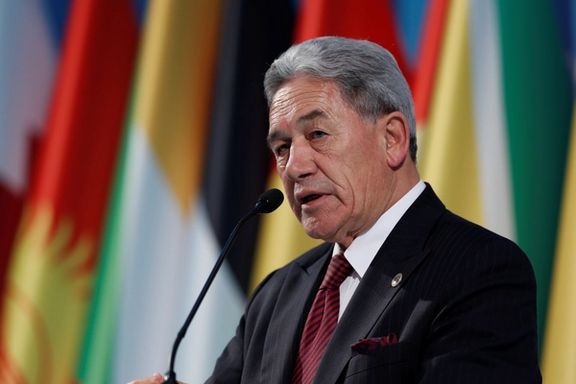
New Zealand announced further sanctions on Iranian actors involved in providing military assistance to Russia, specifically through the production and supply of drones.
The new sanction package also includes Russian individuals and entities involved in the illegal transfer of weaponry from North Korea to Russia for use in Ukraine.
According to a statement by the New Zealand Foreign Ministry, these sanctions target seven individuals and 12 entities providing military support for Russia’s invasion of Ukraine.
The Iranian individuals are Mohsen Vahabzadeh Moghadam, Abbas Abdi Asjerd, and Ehsan Varnosfaderani. The list also includes entities such as Bonyan Danesh Shargh, Alvand Motorbuilding Industries Company, Pishro Sanat Aseman Sharif Company, and Saad Sazeh Faraz Sharif Company.
“New Zealand condemns all those who provide military support to Russia in its war of aggression against Ukraine. The supply of Iranian drones and North Korean weapons to Russia constitutes a threat to Ukraine’s sovereignty and territorial integrity,” Foreign Minister Winston Peters said in a statement on Thursday.
In May last year, New Zealand sanctioned 11 Iranian people and seven entities for supplying drones to Russia.
Since March 2022, New Zealand has imposed sanctions on more than 1,700 individuals and entities, along with a range of trade measures.

Rapper Toomaj Salehi is reportedly facing two new charges that advocates said is an attempt by Iranian authorities to keep the iconic voice of Iran's opposition behind bars.
The charges include 'spreading falsehoods' and 'spreading propaganda against the regime,' according to Negin Niknaam, an Iranian activist and Salehi's friend.
"I think they couldn't execute him because he's now famous. They're afraid of him. So one thing that the regime always does with famous people or artists in Iran is they try to isolate them or keep them in prison. I'm really worried about him," said Niknaam.
The new charges against Salehi could potentially be a crime punishable by death, said human rights lawyer Kaveh Shahrooz.
"Part of the problem with the usual charges they level against dissidents -- moharebeh (waging war on God) & endangering the regime -- is that they're incredibly vague and broad. So one is never really sure what is and is not a crime," said Shahrooz.
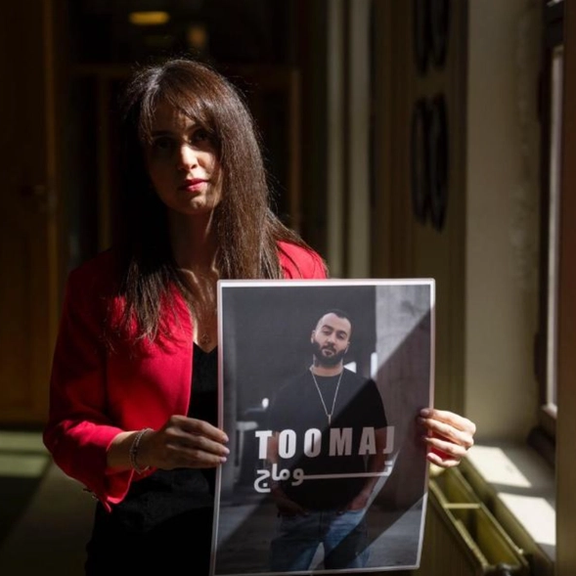
Salehi has been detained since October 31, 2022 in solitary confinement in Isfahan's Dastgerd Prison, which is a in a high-security ward controlled by the Islamic Revolutionary Guard Corps’ (IRGC) intelligence organization.
He rapped about political and social issues exposing the Islamic Republic's abuses through his lyrics. The rapper grew to international fame during the 2022 nationwide Woman- Life- Freedom moment, where he not only used his platform to echo the voice of protestors, but joined them in the streets.
In May, more than 100 music, culture and human rights icons, including Coldplay and Sting, signed a statement demanding Salehi's immediate release.
After international outcry and pressure, Salehi's death sentence was overturned by Iran's Supreme Court in June and less than two weeks after his release on bail, he was rearrested.
The hope of another bail release seems unlikely now, said Niknaam.
"I'm really depressed because we were excited. We were really excited that we heard that he may come out soon," she said.
German Member of Parliament (MP) YeOne Rhie, Salehi’s political sponsor, believes the Iranian government is plotting to keep the critic behind bars.
"I am asking myself why are they doing that? And I think the only reason is because they are so afraid of him that they don't want him out and freedom," said Rhie.
Toomaj is not the first famous activist to have his prison term extended.
Jailed Noble peace prize winner Narges Mohammadi is serving multiple sentences, which amounts to more than 13 years of imprisonment for her human rights activism. Her sentence was extended in January with an additional 15-months in for new charges concerning “spreading propaganda against the state."
Niknaam said she doesn't understand the rationale for the new charges.
"How can someone in prison spread lies or spread propaganda against the regime?...he's in prison, and he's only allowed to call his father and no one else," she added.
Rhie said Iran's new president elect, Masoud Pezeshkian, who was supported by Iran's Reform Front and is portrayed as a reformer, should take action.
"If the new president wants the Western world to believe that he has a reform and he wants to bring more freedom and democracy to the country, he should start right now and he should start with releasing all the innocent people."
Rhie said it would be symbolic for Pezeshkian to order the release of a figure like Salehi, who is often described as the "voice of the people of Iran" and the "son of Iran" but that still wouldn't be enough.
"Because we all know that there are over 20,000 other political prisoners," said Rhie.